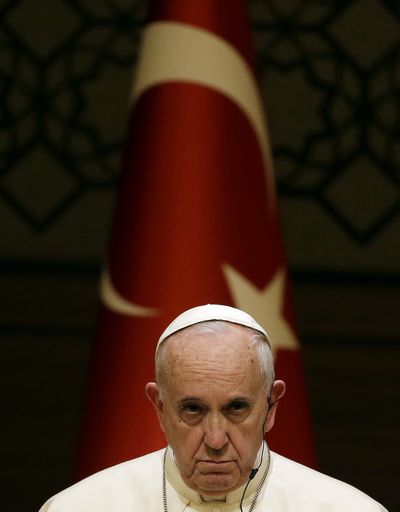In Turkey, pope says force alone won’t end violence

Pope Francis arrived in the Turkish capital of Ankara on Friday at the start of a three-day trip widely seen as an effort to build interreligious dialogue with Muslims and focus attention on the plight of Christians and other minorities in the war-ravaged Middle East.
“Fanaticism and fundamentalism, as well as irrational fears which foster misunderstanding and discrimination, need to be countered by the solidarity of all believers,” the pontiff, accompanied by President Recep Tayyip Erdogan, told dignitaries gathered at the nation’s lavish new presidential residence.
In his address, Francis cited the anguish of “prisoners and entire ethnic populations experiencing the violation of the most basic humanitarian laws,” noting specifically the suffering of Christians and Yazidis, both facing persecution in war-torn Iraq and Syria.
As a counterpoint, Erdogan condemned “escalating racism, xenophobia and Islamophobia in the West,” denouncing “the racist perception which associates Islam with terrorism.” He also criticized global “double standards,” pointing to what he called a lack of international resolve against government violence in Syria, Israeli actions in Gaza and Kurdish terror in Turkey.
Keen to replace Syrian President Bashar Assad with a more pliable ally, Erdogan’s government has aggressively aided Syrian rebel factions and facilitated the entry of militant Islamists and other insurgents into Syria.
Turkey has been a notably reluctant partner in the U.S.-led campaign against Islamic State, the al-Qaeda breakaway group that has seized vast stretches of territory in Syria and neighboring Iraq, and has pushed for more direct Western intervention to topple Bashar Assad.
Striking a careful balance in meetings Friday with Turkey’s political and religious leaders, Francis decried the “barbaric violence” of Islamist extremists and reaffirmed that force was justified against “an unjust aggressor.” But he stressed “the problem cannot be resolved solely through a military response” and appealed for greater dialogue among the region’s Muslims, Christians and Jews.
“As religious leaders, we are obliged to denounce all violations against human dignity and human rights,” Francis told Turkey’s top cleric, Mehmet Gormez, and other officials gathered at the government-run Religious Affairs Directorate. “As such, any violence which seeks religious justification warrants the strongest condemnation.”
Francis is the fourth pontiff to visit this overwhelmingly Muslim nation – and the first foreign head of state hosted at the highly controversial “White Palace,” denounced by critics as an extravagant symbol of Erdogan’s polarizing and authoritarian leadership style and grandiose ambitions.
While the Argentine “people’s pope” is known for eschewing the trappings of office, the Vatican rejected pleas from opposition activists and others that he decline to set foot in the palace, saying he would be received where officials chose to receive him.